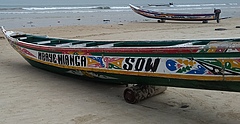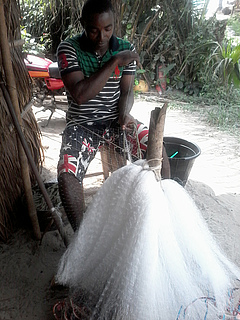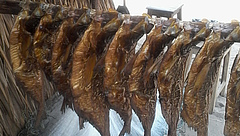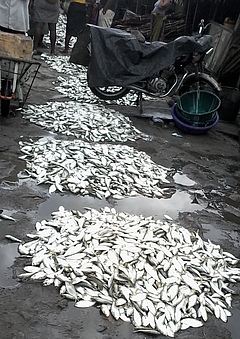Small-scale fisheries’ large contribution to food security

Typical senegalese fishing canoe. (Picture: Julia Hoffmann)

Fisher mending the nets. (Picture: Garanwei Tosan)

Affordable fish provides a much needed source for protein. (Picture: Garanwei Tosan)

Local market development is an important factor of influence for food security. (Picture: Oluwakemi Omowunmi)
Report by Kira Lancker, PostDoc Biodiversity Economics at iDiv and UL, and first author of two new publications in Food Policy and PLoS ONE:
Leipzig, Kiel. Food security is a global challenge. In a few years, food for 9 billion people has to be produced and distributed fairly. Small-scale, canoe-operated fisheries provide food and income in many developing regions. We are now able to model these contributions to food security and to predict how fish stock fluctuations, market development and climate change affect them. Our application to a Senegalese fishery reveals that if coastal inhabitants lost access to their resource, this would mean a loss equivalent to 2% of per capita yearly food cost. The value of the fishery for local food security also amounts to more than five times the yearly revenue earned through the current EU-Senegal fishery agreement. Our results help policy-makers to decide how to use marine resources towards better ethical and economic decisions.
Policy-makers have to decide how to use marine resources. Often, they tend to sell fishing rights to the highest bidder, e.g. to the EU, because the lack of information about the value of small-scale fisheries makes a comparison difficult. To make a well-informed decision on this kind of agreements, policy-makers need to know the value of the small-scale, artisanal fishery to their nation's food security and the consequences for food security when the local fish stocks were reduced due to foreign fisheries agreements.
Fisheries agreements affect the food security of the population
Our analysis shows that such reductions in fish stocks changes fishing cost, fish prices and the number of fishers and canoes simultaneously. The quantification of the overall net effect is therefore a new, major and necessary achievement. Our clarification of causal relationships also provides insights into similar small-scale fisheries around the globe, where data is often unavailable.
In the EU project PREFACE we cooperated with researchers from the Christian-Albrechts-Universität Kiel to develop a model that captures the complex nature of small-scale fisheries. We include decisions of fishers and local fish consumers, labor and capital markets as well as the biological productivity of fish stocks and climate impacts.
In a recent Food Policy paper, we show that small-scale fisheries make a large contribution to food security in two ways: The local population has access to affordable protein food. Fishers, who have few alternatives as demonstrated by their willingness to accept low incomes, earn the income needed to cover food expenses.
We were also able to examine the importance of local market development. An urban region with a busy local market provides consumers with access to meat and other non-local food, i.e. a more diverse choice of protein food. These consumers depend less on locally caught fish. Our model captures this effect remarkably well and shows that market development plays a crucial role for small-scale fisheries: The local fish harvest is of far greater relevance for consumers in remote regions.
Climate change can severely affect small-scale fisheries
In a second part, we cooperated with climate scientists from Norway and The Netherlands, to reveal the impact of climate change. We find that warming waters cause fish to move closer towards the coast, where fishers can easily catch them. Fishing costs decrease and fish becomes cheaper for consumers, leading to an increase in demand.
We demonstrate in our second paper, published in PLoS ONE, how this can lead to unsustainable over-harvesting, and finally extinction of the local fish stock. Without counteracting policy, we estimate that the fishery will become economically extinct between 2030 and 2035. However, we also find that in the medium term, climate change will not alter biological productivity. If fishers and policy-makers were able to avoid over-harvesting, the future contribution to food security and income could even rise compared to current levels. In other words, climate change may alter the need for resource management in a fishery.
Kira Lancker
Original publication:
(iDiv scientists in bold)
Lancker, K., Fricke, L., Schmidt, J. O. (2019), Assessing the contribution of artisanal fisheries to food security: A bio-economic modeling approach, Food Policy, in press, doi: 10.1016/j.foodpol.2019.101740.
Lancker, K., Deppenmeier, A.-L., Demissie, T., Schmidt, J. O. (2019), Climate change adaptation and the role of fuel subsidies: An empirical bio-economic modeling study for an artisanal open-access fishery, PLoS ONE, doi: 10.1371/journal.pone.0220433
Contact:
Dr Kira Lancker
Biodiversity Economics
German Centre for Integrative Biodiversity Research (iDiv)
Leipzig University
Tel: +49 341 9733265
Email: kira.lancker@idiv.de
www.idiv.de/en/groups_and_people/employees/details/eshow/lancker_kira.html
